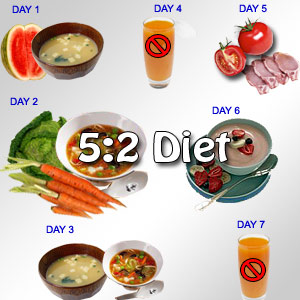Intermittent Fasting Diet

In the past few months, the 5:2 diet or the Fasting Diet has been creating a buzz for its quick weight loss results. Also called Intermittent fasting, this diet promises you 5 days of normal eating and 2 days of very low calorie fasting.
What started off as a weight reduction diet by Michael Mosley in the UK spread to Europe and the USA where it is being hailed as a sure-fire diet to lose weight! Hollywood celebrities like goddesses Gwyneth Paltrow, Jennifer Lopez and Jennifer Anniston have given the thumbs up to the 5:2 diet.
The Fasting diet
With this Fasting diet, you can eat normally on 5 days of the week and nearly fast for 2 non-consecutive days. On a fasting day, a woman is allowed 500 calories and a man 600. The trick to weight loss lies in watching what you eat on normal days. Opt for largely healthy foods. The Fasting diet needs to be followed for months on end to see good results.
Studies have shown that followers of this diet have seen lowered cholesterol and blood pressure. Intermittent fasting is said to have positive effects on the body. It is said to lower the level of potentially cancer causing cells. The 5:2 diet is also said to provide protection against diabetes and Alzheimer's.
Practicing the 5:2 diet
Many weight watchers see this diet as allowing them to indulge for a few days and eat light on others. They see this as a way to give vent to their taste cravings and yet keep aboard a weight-loss program. In fact, some even do not cook on the fasting days lest they are tempted to eat. So popular is this diet that you can just tell your friends or co-workers that you are on your fasting days and they will keep the bread basket away.
For the fasting days, you must plan your calories well. Fill up on foods that are lower in calories so that they give you more satiety. Choose fish, salads, beans and vegetables. Go in for warm drinks as they tend to make you feel fuller. You can choose to have a 300 calorie breakfast and 300 early dinner and drink warm water during the day. Alternatively you can nibble on low-calorie foods 4 times in the day. But starting a fasting day with a good breakfast is surely beneficial.
- You can drink in moderation during your normal days. But make wise choices by going in for lower calorie drinks.
- The days for fasting and normal eating are not rigidly defined. You need to see that you fast for 2 non-consecutive days every week.
- You don't have to buy any special food nor are there any 'forbidden foods'.
- Make wise use of herbs, seasonings, light dressings and lemon juice to perk up your salads and dips.
Skeptics of the Fasting diet point out that it might not be sustainable over a long period. Besides, the body might find it very difficult to adjust to a sudden drop in calories. There is also the possibility of overeating after bouts of fasting. Extreme dieting leads the body to go into starvation mode, thereby hampering weight loss. Very few calories can lead to irritation and fatigue. You might also crave sweet and starchy foods. Dizziness and dehydration can result. This Fasting diet must not be tried by pregnant and lactating women and diabetics.
Ensure that you keep yourself well hydrated when you embark on this type of intermittent fasting. Eat healthy on your normal days - plenty of complex carbohydrates, good quality lean protein, fruits and vegetables.
Top of the Page: Intermittent Fasting Diet
Tags:#5:2 diet #intermittent fasting diet #Mosley diet #fasting diet

Therapeutic Lifestyle Changes Diet
Intermittent Fasting Plan
Flexitarian Diet
Dukan Diet Plan
Diet Plateau
High Protein Diet
Elimination Diet
Raw Food Diet
Paleo Diet
Liver Cleansing Diet
Intermittent Fasting Diet
Low Fat Low Cholesterol Diet
Low Carb Diet
Vegan Diet Plan
Hay Diet
Sacred Heart Diet
Heart Attack Diet
Diet after Gastric Bypass
RICE Diet
Gluten Free Diet
Acid Reflux Diet
Detox Diet
Sonoma Diet
Glycemic Index Diet
Montignac Diet
Diabetic Diet Plan
Healthy Breastfeeding Diet
Negative Calorie Diet
Fad Diet
Blood Group Diet
Diverticulitis Diet
DASH Diet
Ornish Diet
3 Day Diet Strategy
Ketogenic Diet
Zone Diet Plan
Anti Aging Diet
South Beach Diet
Gall Bladder Diet
Low Cholesterol Diet
Low Sodium Diet
Diet and Kidney Disease
Scarsdale Diet Plan
Macrobiotic Diet
Osteoarthritis Diet
Depression Diet Plan
Migraine Diet
Restricted Salt Diet
Gout Diet
Rotation Diet
Diet Cancer Patient
Ways to better Health

Boost Metabolism
BMI Calculator
Low Fat Dessert
Whey Protein
Diet and Fitness
Fitness Exercise Articles
Cardio Workout
Aerobics
Yoga
Body Toning
Top of the Page: Intermittent Fasting Diet
Popularity Index: 101,299

